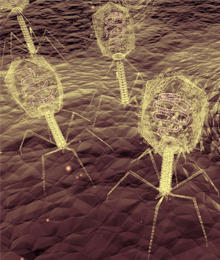An interview with Dr Callum Cooper
October 2020
Dr Callum Cooper is a Senior Lecturer in Pharmaceutical Microbiology at the University of Sunderland. He is also a member of the Microbiology Society and in this interview, tells us more about bacteriophages and how we can use them to treat antimicrobial resistant bacteria infections.

Tell us about your current role and area of research.
I am currently a Senior Lecturer in Pharmaceutical Microbiology at the University of Sunderland. This role involves teaching microbiology to Pharmacy and Biopharmaceutical Science students.
Although I try to maintain a relatively broad base of research topics, my primary focus is on the biology of bacteriophages and their use as antimicrobial agents.
Why is your research important?
Most, if not all, microbiologists will tell you that the continuing development of antimicrobial resistance is among the biggest medical challenges of the 21st century that urgently needs to be addressed. To effectively do this we need to look at not only making sure that the antibiotics we have remain effective, but develop new antimicrobial agents that work in different ways to those that already exist.
In the normal environment, phages are very important, contributing to the genetic diversity of bacterial populations, by spreading genes and acting as a check on bacterial populations usually on a limited number of strains. In my research, it is this second part of this that we need to harness as some phages essentially hijack bacterial cells, make copies of themselves and then kill the cells as they escape. By understanding what criteria make phages effective at infecting and reproducing in bacterial cells, we can start to select more effective phages that can hopefully be used as effective targeted treatments for antimicrobial-resistant bacterial infections.
Where did your interest in microbiology come from?
I was always interested in science and how things worked ever since I was very young (my parents sent me off to school as soon as possible, because I kept questioning how things worked); but in terms of microbiology, my interest started when I was as a fresher in Lancaster. At the time, I covered a wide range of topics but I was really fortunate to have several really good microbiology lecturers who made the theory interesting but also gave me plenty of time in the lab to get my hands dirty, which gave me the basic skills needed to do research. Even to this day the aspects of microbiology I enjoy teaching and doing the most are lab based.
What qualifications did you obtain before starting this role?
I took the normal route into academia; I started with a BSc (Hons) in Biological Sciences with Biomedicine (Lancaster University), gained an MSc in Biomedical Science (UWE Bristol); a PhD (Cardiff University), as well as various postdocs (Cardiff University, Stockholm University).
Can you describe a typical working day for you?
I have found that in academia, there is no such thing as a typical day. No matter how organized you try to be, something unexpected appears on a daily basis and needs to be dealt with sooner rather than later. More often than not, my daily routine involves delivering lectures or lab practical’s, marking and meeting with students to talk about their projects; discussing how they can overcome various aspects of the course that they may be struggling with and offering pastoral care where appropriate. If I’m lucky I get the chance to catch up with some of my research commitments including editorial work, peer reviewing articles and occasionally the odd experiment.
What are the challenges you face in your work and how do you try to overcome them?
As a newly appointed academic, some of the major challenges I currently face surround balancing my teaching commitments and trying to remain research active as well as securing funding. This has been a steep learning curve from my time as a postdoc where I only had to focus on the research. I’m fortunate to share office space with likeminded people who have been incredibly supportive and happy to let me bounce various questions/ideas off them, especially when I do not know how to do something I would say you never really overcome these challenges as the situation can change very quickly, but you certainly learn how to prioritize what is important and what can wait a day or two.
Why is it important to be a member of an organisation like the Microbiology Society?
When I was a PhD student, I was encouraged to join the microbiology societies in the UK as a way of developing the contacts that I had and to seek funding to enable me to attend conferences at which I could present my work. Being a member gives you the ability to not only do these things but also to engage and potentially influence various aspects of policy, communicating the importance of your work to the community generally, and the wider world.
Why does microbiology matter?
Although we are constantly scratching away at the surface of what we know about microbes, there is so much more to learn, and they never fail to surprise us. If recent history has taught us anything it is that the interactions between various organisms and microbial species can have severe consequences to the world around us.
If you are a member of the Society and would like to find out more about how you can get involved with Society activities and/or showcase your research, please email us at [email protected].


